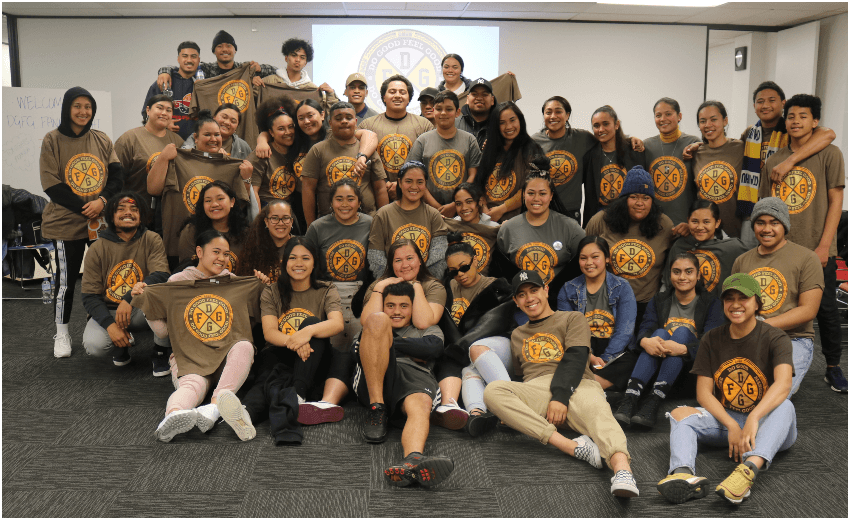The upheaval of this latest level three lockdown has hit South Auckland hard, particularly its young people. However, as Justin Latif reports, a youth-focused social change initiative has been helping them get by, and empowering them to help their own communities.
Fereni Peti began to feel sick a day after attending her Māngere East church with her mum.
As the flu-like symptoms got worse, she knew she needed a Covid test. What she didn’t realise was that she had potentially been sitting a few pews away from a person who was actually positive for Covid.
“On Tuesday I went into the doctors and they did a Covid swab, and that same day I found out someone had come into church who had tested positive as well,” the Papatoetoe resident says.
The 22-year-old says the wait for results was agonising. “For me, that was pretty scary as I had made a lot of contact with other people, not just my family, but friends as well,” she says.
“It was scary just waiting, and I was self-isolating at home, and even though my family thought I was a bit crazy at first, I just didn’t want anyone to get sick.”
Peti’s test would eventually come back negative but the idea that she could have infected her family of seven, or someone in her wider circle, was frightening knowing the greater risk it posed for those with health conditions.
“I think our cultural values around upholding our families first means we always want to protect our families, and that’s why we’ve been trying so hard to prevent it from spreading.”
For Peti, Covid has brought the added pressure of becoming a breadwinner, following her father’s redundancy during the first lockdown. But she credits her second family at Do Good Feel Good (DGFG), a youth-led movement of 17- to 24-year-olds, as the key to getting through these stressful times.
“In the first lockdown I was mentally struggling, but Chillion and the leadership team were there to support me through that – they are the type of people to check in on you even without asking.”
Chillion Sanerivi is a youth systems innovator for the South Auckland-based charitable trust The Cause Collective. He started DGFG five years ago as a way to support Māngere young people with their health and wellbeing.
The initiative has now evolved into a youth movement focused on leadership development and social change, helping young people to put their talents to use for their community. There are currently 100 active members who are part of suburb-based squads, or Skwads, as they call them, which stands for “serving kindness with acts and deeds”. During lockdown the Skwads have regular Zoom catch-ups to talk about how they are coping and to inform the young people what services are available. Prior to the level three and four restrictions, the group ran events around the community, including clean-ups, group exercise sessions and dance pop-ups, and supported young people to get involved in causes like climate change action.
Sanerivi says it’s all about giving young people the chance to be the change they want to see. “There’s a common narrative that the young people in South Auckland are the problem, but when you talk directly to young people, they say they are the solution,” he says.
“DGFG is essentially a positive alternative for young people to lead in their own aspirations and interests.“
Another initiative DGFG has sparked following the latest outbreak is to look at how local churches, and in particular their youth pastors, can be mobilised.
Sanerivi says more than 70 youth pastors met this week over Zoom to develop an action plan on how their young people can support their congregations.
“We want to identify from all the different churches, ‘What are the needs and what does support look like?’, and to explore together an action plan on how the young people can help protect their churches’ congregations.”
Emily Luatua joined DGFG four and a half years ago and is now a leader for the wider movement, as well as running the Māngere Skwad.
She says Pasifika young people have the unique challenge of being the main translators for their families as they navigate this rapidly changing society.
“In the last 10 years especially, with the increase in technology, it’s hard for our elders and our parents to keep up. They are so used to do everything manually, so for us young Pasifika, we know we need to pick it up and explain it to our parents.”
Peti, who is studying a Bachelor of Science at Auckland University, says DGFG is basically helping her build the confidence and life skills she needs not only to get through these Covid-related lockdowns but also to create ongoing change for her community.
“I’ve seen a lot of changes in myself,” she says. “I’m now comfortable doing the uncomfortable. They’re always pushing you to do things out of your comfort zone, without forcing you. And it’s just been a space where there’s a lot of young people who have the same mindset as you, which is to bring about positive social change.”



